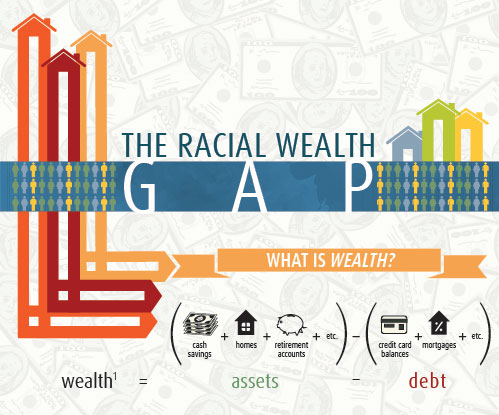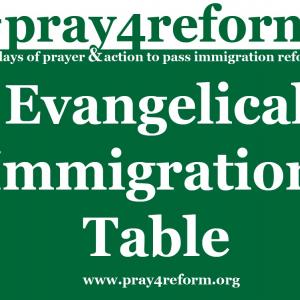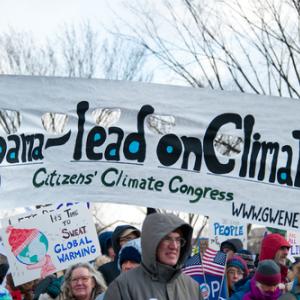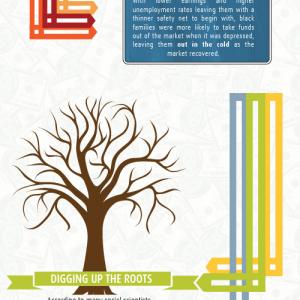
Janelle joined Sojourners in 2012, first as a Campaigns Assistant in the Cycle 29 intern class and as Online Organizing Associate until 2015. Before coming to Sojourners, Janelle worked with Mennonite Central Committee (MCC) in Bujumbura, Burundi.
Janelle grew up in the DC area. She first became interested in social justice in her (Catholic) high school religion class, which focused heavily on nonviolent movements in India and El Salvador. She chose to act on that passion by studying international relations at American University; an internship at MCC’s Washington Office sparked a deeper interest in policy advocacy.
Janelle lives in Hyattsville with her husband Frank and their fluffy cat Maggie, and attends Hyattsville Mennonite Church. She loves board games, good beer, craft projects, long walks, and pretty much anything else you might throw at her.
While Janelle doesn’t remember how she first heard about Sojourners, her mother grew up in a household that got The Post-American so perhaps it runs in the blood.
Posts By This Author
It's On Us, Too: An Open Letter to Theological Schools About Sexual Assault
According to the Broken Silence survey (commissioned by Sojourners and IMA World Health), faith leaders play a key role in preventing and responding to such violence. Though a majority of respondents reported feeling ill-equipped to deal with issues of sexual and domestic violence in their congregations and communities, an overwhelming majority of faith leaders (81 percent) indicated that they would take appropriate action to reduce such violence if they had the training and resources to do so.
This gap is precisely why seminaries and divinity schools are essential to addressing domestic abuse and sexual assault. Your theological schools can and must take the lead on educating more faith leaders about sexual and gender-based violence.
Top 10 Reasons to Support Sojourners This Year
As part of our extended Sojourners community, we want you to know how important your donations are to supporting our prophetic work for faith in action for social justice. Click here to make a donation now and read on to learn about how you’re helping us to make an impact!
1. Because the future church isn’t going to lead itself: Sojourners is working around the clock to make sure that those who will be leading the church in 2050 are equipped today. Every year, we print hundreds of articles by 10 yearlong interns and our cohort of 17 Emerging Voices, helping them find their voice and analyze issues of justice. Who do you want leading the church that your children, or your grandchildren, will be attending? We thought so: leaders who apply justice to faith are crucial for the next generation.
Hope in the Dark Times
The first time I really got it, I was 16 years old.
I had traveled by myself to visit distant relatives in Paris, with the hope of improving my French. Somehow, a weekend visit to the beach ended up with me on an unaccompanied trip on a train from a lazy seaside town back to the city. “I’m lonely here, God,” I thought. “Would you show me you are with me?”
Looking out the train window, there was a brilliant sunset hanging over the fields of canola flowers. There was my reminder of God’s love! As the train curved away from the sunset and it fell out of view, I sat back in my seat, satisfied with the gift I had been given … only to start up again as the train took a sharp curve to the left, the sunset back in full view.
“Oh,” I thought, “that’s what they mean by love being abundant and our cups overflowing. I get it.”
The first time I really got it, I was 18 years old.
On my first winter break back from college, I was driving in my parents’ car, listening to the radio. On air was a county executive discussing why a curfew might be a good idea for the county’s youth. According to him, instituting the curfew would help police arrest young people they suspected of other crimes. The implication was that it would only be enforced against those people who looked suspicious. Another voice on the show expressed concerns that what this meant was that the curfew would only be enforced against black teenagers.
“Oh,” I thought, “this is what they mean when they say the police target people they instinctively assume to be suspicious, even if they haven’t done anything wrong. I get it.”
Why Earth Week Matters
 Editor's Note: Sojourners is celebrating Earth Week with a special message series every day next week. Click here to join us!
Editor's Note: Sojourners is celebrating Earth Week with a special message series every day next week. Click here to join us!
“Behold, I am making all things new!” says Jesus in the book of Revelation. It’s this spirit of hope and second chances that we celebrate at Easter time. Life triumphs over death and decay. We get a second chance.
But what about our planet? A cursory glance shows us that God’s creation could use some renewal.
Creation is definitely groaning. We’re losing species, spilling oil, and changing our climate at an alarming rate. We’re building sea walls and responding to pumped-up natural disasters. Energy companies are pushing for even more access to the fossil fuels that are harming God’s creation. Action from Congress seems far away, and moneyed special interests are working hard to block other kinds of action.
In the War on Poverty, Women Need a Boost
Sojourners campaigns assistant Anna Hall posted a great piece last week de-bunking 5 myths about the minimum wage. One of these myths — that most minimum wage workers are suburban teenagers — was countered by the facts: nearly two-thirds of minimum wage workers are adult women.
Don’t think of a suburban teenager — think of a single mother working full time while trying to raise her children, care for her family, and make enough to pay rent, probably without any paid sick or personal days (not to mention maternity leave). Could you do that on $15,000 a year?
On Jan. 13, Maria Shriver – who, in addition to her many accomplishments, is the daughter of the statesman widely regarded as the architect of the “War on Poverty” — released a report focusing on the needs of women in the current economy.
We Can Help Stop Rape in the Military
By official estimates, 26,000 people are sexually assaulted in the U.S. military each year. That comes out to 71 people every day. It’s an epidemic that’s been widely reported in the news.
As if that weren’t bad enough, most of the assaults go unreported – only 11 percent of assault victims ended up filing reports last year (3,374). Studies show that those who do not report the assault cite fears of retaliation and a concern that nothing will be done.
Leaders in Congress are trying to change that this week with the Military Justice Improvement Act.
Right now, if a woman is sexually assaulted in the military, her case is evaluated by a commanding officer. This officer decides whether to bring the case to trial. Once it has been tried, the same commanding officer is responsible for enforcing the consequences. That’s called “convening authority.”
Speak Out Sunday Helps Faith Communities Address Tough Issues
In the United States, more than 1 in 3 women (and 1 in 4 men) havereportedly experienced sexual assault, physical violence or stalking by an intimate partner during their lifetime.
These are not numbers that disappears when you walk in to a church. Christian women are subject to sexual and gender-based violence, too – but when is the last time you heard about this issue in a church?
Talking about the pain and fear of intimate partner abuse can seem daunting, but there are resources to help faith communities get started. On Sunday, Nov. 24, faith communities have an opportunity to speak out against sexual and gender-based violence in the aptly named Speak Out Sunday.
Shutdowns and Shootouts – My New Hometown Normal?
It’s a rough month to be a Washingtonian.
My morning bike ride past the Capitol Building is leaving me less with the sense of inspiration I used to feel at being so close to the heart of democracy, and more with a creeping sense of disgust. Sometimes it’s tough to live in a city whose very name is a synonym for Congress. “Washington” recently decided to cut off all funding for national parks, health research, and, oh yeah, programs that serve poor Americans.
Thanks to Congress, poor women might not get help from the Women, Infants and Children program to feed their babies. Head Start preschool programs have been canceled, leaving parents unable to work. People who need the SNAP program to feed their families could be left with nowhere to turn, while sick and elderly people who get regular visits from Meals on Wheels volunteers are worried about where their food will come from over the coming weeks.
There are about 40 members of an extremist ideological minority who are ruining the reputation of the place I live and work, and taking the poor down along with them.
Pipeline, Meet the Nuns
Pipeline projects are moving forward across the country, but a group of tuneful nuns is working to make sure they don’t succeed.
The Sisters of Loretto in Marion County, Kentucky have lived on their rural acreage since the 1800s, serving the poor and enjoying the wide open spaces and forest trails of their home.
With a fracking company proposing a pipeline for pressurized natural gas chemicals through their land, the sisters have sprung into action to protect what they see as their “holy land.” They have refused to allow the fracking company to survey their land for pipeline construction, citing past pipeline explosions and the risk of contamination.
The sisters appeared at a public hearing over the proposed pipelines, singing “Amazing Grace” until they were asked to be quiet. Their unexpected activism has gained them attention locally and across the internet (you can meet the sisters by watching this video.)
A Simple Fix to Reduce Poverty and Encourage Work
Jesus calls us to help the poor. That is a point that few would debate. One key indicator of our obedience is how we treat the poor and vulnerable among us. Where we fall into debate is how to do it the most effectively.
One thing that gets lost in the rhetoric is that many of the solutions we have are already effective — they just need to be improved. And we have plenty of ideas that already help lift families out of poverty while encouraging them to work. Sounds perfect, right?
The Earned Income Tax Credit (EITC) is one such program. It provides a tax credit based on how much income a worker takes in — the more income they take in, the more benefit they get, up to a maximum point when it starts to phase out. This gives working people incentive to keep working rather than rely on assistance alone.
Evangelical Scientists Call for Climate Action
When you think of an evangelical Christian, do you think of a climate scientist who is passionately concerned about the impact of climate change?
After this week, you should.
Over 200 top scientists who identify as evangelical Christians from across the country released a letter this week calling on Congress to act on the moral and scientific imperative to address climate change. The letter — framed in scripture — points to the call to care for the poor and steward God’s creation as key elements contributing to their concern.
Evangelicals Urge House to Move Forward On Immigration Reform
On the eve of the GOP immigration summit, during which Republicans will determine their position and strategy on immigration reform, the Evangelical Immigration Table held a press conference with national leaders to strongly urge House members to find the political courage to move forward on commonsense immigration reform.
“We have forgotten to engage in conversation and instead have focused on throwing stones at arguments,” David Cooper, President and Head of School at Front Range Christian School in Littleton, Colo., said.
Currently, hundreds of Evangelical Christians are expected to join in a day of prayer and action in Washington, DC on July 24, following the 92-day Pray4Reform challenge. During this challenge, people of faith across the country are taking a few minutes each day to lift up their political leaders in prayer as they consider the options moving forward. More than 25,000 prayer partners have signed up for the challenge since its start, and we welcome many more to join.
As the World Turns, Congress Stands Still on Climate
Forget about future generations – climate change is already hitting poor people around the world, not to mention contributing to natural disasters in the U.S. from New York City to Arizona. Apparently that’s not enough for some members of Congress, who have chosen to use their authority to try to block any and all attempts to do something about the problem.
Earlier this month, President Barack Obama announced a major, comprehensive plan of action on climate change – changes that would do much to protect human health, the poor, and future generations by mitigating some of the worst impacts of climate change. A central part of the plan is to address climate pollution at its largest source: coal-fired power plants.
Unfortunately, many members of Congress are already taking steps to decry the president’s plan as a “war” – on coal, on American energy, and yes, even on America itself. Leaders from John Boehner to Michele Bachmann to Joe Manchin have made it pretty clear that they view attempts to care for creation as an assault on our country.
Senate Passes Immigration Overhaul; Top 10 Reasons It Matters
By a 68-32 vote, the Senate just passed S.744, a bipartisan immigration reform bill that people of faith have held up as part of a solution to the United States’ broken immigration system. While it still has to make its way through the House of Representatives, here are the top 10 things that would happen if S. 744 became law:
1. It would create a roadmap to citizenship for aspiring Americans.
Current immigration law has no way forward for immigrants who don’t have the right documents. The Senate bill would open doors for them to become full members of society.
2. It would bring hope to lots of people.
Around 8 million of the 11.4 million aspiring Americans living in the shadows would be able to gain legal status, giving them hope and opportunity. That’s as many people as live in the entire state of New York – a huge impact.
Obama’s Climate Action Plan Paves a Road Ahead
Yesterday was a momentous day for the creation care movement: after years of inaction from Congress, President Obama announced a major, comprehensive plan of action on climate change. President Obama’s new “Climate Action Plan,” which he laid out in a speech at Georgetown University Tuesday, addresses the country’s largest source of climate pollution — carbon dioxide from power plants — as well as boosting energy efficiency standards, renewable energy production on public lands, and resilience for cities, towns and roads.
The Death of a Talking Point: Immigration Reform Could Save Taxpayers $1 Trillion
People of faith and immigration activists around the country have their eyes fixed on Congress this month as both houses take up immigration reform. The bipartisan proposal being considered in the Senate would bring hope and opportunity to 11 million new Americans who aspire to be citizens, doing much to fix our broken immigration system.
While the path forward will be difficult, there is some good news this week that will influence the way policymakers think about this issue.
Conservative lawmakers have long been worried about the future costs of immigration reform, which they predicted would come from federal programs designed to help the poor such as Medicaid. They asked the Congressional Budget Office – a non-partisan government agency tasked with evaluating the cost of all legislative proposals – to give them a report far into the future to make sure that these costs were not hidden in their analysis.
In reality, the CBO found that bipartisan immigration reform in the Senate would trim nearly $1 trillion off the federal deficit, while spurring the economy and creating jobs.
Nuns on the Bus Back in D.C.
The Nuns on the Bus stopped by Washington, D.C., this week, and Sojourners staffers were on hand to return high fives and listen to speeches from the sisters and leaders in the labor movement. This was just one stop on the national bus tour in support of comprehensive immigration reform. The traveling sisters are encouraging people across the country to raise hands and voices in support of faith, family, and citizenship.
Check out the photos of the Nuns on the Bus’ visit. We’ll be praying for the sisters as they continue their journey!
Pandora Refuses to Run* Hate Ads After Immigration Reform Supporters Protest
FAIR’s recent ad campaigns have attempted to whip up fear and hatred for immigrants by claiming that they will steal jobs from working Americans. This kind of thinking has been debunked numerous times – immigrants contribute to the economy and help start small businesses.
Pandora radio has 70 million users listening 1.31 billion hours each month. That’s a lot of people who were hearing ads based on fear rather than facts.
Along with other groups, Sojourners contacted Pandora and asked them to stop playing these ads. We understand that everyone has the right to say what they want – free speech – but we’re glad that civil society and consumers can put pressure on companies to limit the amount of harmful speech we hear every day.
Pandora has ended the relationship* after reviewing FAIR’s record. Thousands of Sojourners readers signed a petition asking them not to accept hateful ads in the future, and donated to help Sojourners run ads with positive messages highlighting the contributions immigrants make to our communities and their inherent dignity as human beings created in God’s image.
In the Richest Country in the World, 1 in 4 Struggle to Afford Food
 The United States is the richest country in the world, but only three-quarters of Americans have enough to eat.
The United States is the richest country in the world, but only three-quarters of Americans have enough to eat.
New data from the Pew Research Center shows that nearly a quarter of Americans had trouble putting food on the table last year — 24 percent is a lot of hungry people in the richest country in the world. It’s not normal, either – most other advanced economies had much lower rates of hunger. We think that the U.S. economy is similar to that of Canada or Britain; our hunger rate is closer to that of Indonesia, South Korea, or Greece.
Numbers like that are shocking, because we prefer to think of ourselves in nationalistic terms. “The richest, most powerful country on Earth” definitely makes us feel better than realizing that things aren’t so great for many of us. One in four of us is hungry.
We don’t like to think about this, but we aren’t doing so well by a lot of standards. Last month, UNICEF published a report on child wellbeing in developed countries. The United States was ranked 26 out of 29, above Lithuania, Latvia, and Romania. Our children were doing worse than those of Greece.
Is this really where we want to be?
Casting the First Stone in the Senate
The Farm Bill might not sound like the most exciting piece of legislation ever to come out of Congress, but it has huge implications for nutrition in the United States. Among other things, the Farm Bill determines support to small farms, promoting farmers’ markets, and, oh yeah, the Supplemental Nutrition Assistance Program (SNAP), what we used to call food stamps.
SNAP is one of the most effective anti-poverty programs, set to expand with increased need and decrease when people no longer need help. Most benefits are modest, and the majority of recipients who are able to work do. In fact, SNAP is effective because it not only helps people get the food they need, but its benefits encourage them to find work.
Unfortunately, it seems like both houses in Congress are set on changing the SNAP program for the worse. Putting aside the cuts the House has planned for nutrition assistance that would kick 2 million people off the program, the Senate recently accepted a change to SNAP that flies in the face of the criminal justice system and will probably have racially discriminating effects.
















